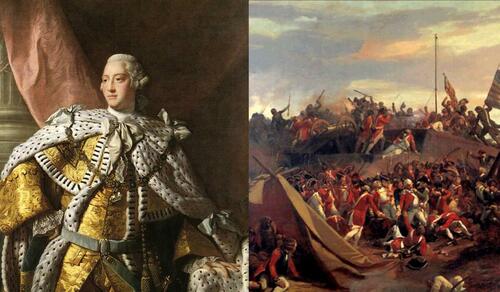
The 1775 Two Step That Led To American Independence
Authored by Jim Bovard
As Americans prepare to celebrate the 249th anniversary of the Declaration of Independence, we should also toast the 250th anniversary of a savvy political two-step that paved the way to formally breaking with Britain the following year.
“We, your Majesty’s faithful subjects…” began the petition beseeching reconciliation with King George from the Second Continental Congress on July 5, 1775. That offering became known as the Olive Branch Petition. The following day, Congress issued its Declaration of the Causes and Necessity of Taking Up Arms, explaining why hostile British troops would henceforth be gunned down on the battlefields of America.
Were the petition and the Declaration on Taking Up Arms sent to England on the same ship? If so, was a sticker attached to the Olive Branch petition saying, “Open me first”? The petitioners “entreat your Majesty’s gracious attention to this our humble petition,” stressed their “utmost deference for your Majesty,” boasted that “our breasts retain too tender a regard for the kingdom from which we derive our origin,” and stressed that they remained “faithful subjects” to “our Mother country.”

Even tying a red ribbon around that petition would not have helped. King George III refused to accept it or even to read it. The king’s obstinacy helped spur the rarely remembered provision of the First Amendment of the Bill of Rights, the right “to petition the Government for a redress of grievances.”
That Olive Branch petition was fiercely controversial within Congress. Virginia delegate Benjamin Harrison declared, “There is but one word in the paper of which I approve, and that is the word, ‘Congress.’” Harrison was later elected governor of Virginia; his son and great grandson both became U.S. presidents. The Olive Branch petition passed as one last attempt at reconciliation with the British monarch in part because many Americans believed that the king had been misled by his corrupt or devious advisors. This was the 1700s version of the Russian folk saying “if only the Czar knew about all the starving peasants!”
King George’s response to the petition was shaped in part by the British military disaster at Bunker Hill, when patriot sharpshooters killed or wounded every British officer on the battlefield amidst a vast carnage inflicted. That Pyrrhic victory spooked the British generals but the lesson was not learned until far too late in London. Two days after the Olive Branch petition was delivered to British officials in London, the British government formally labeled the American colonies in a state of “open and avowed rebellion” and called for “utmost endeavours to withstand and suppress such rebellion.” The subsequent vast increase in British aggression swayed hundreds of thousands of Americans’ minds in favor of independence at any cost.
The July 6 Declaration, written by Thomas Jefferson and John Dickinson, castigated “the legislature of Great Britain” which “attempted to effect their cruel and impolitic purpose of enslaving these colonies by violence.” Americans felt that the British legislature had been warring on them practically since the day the French and Indian War ended. The Declaratory Act of 1766 announced that Parliament “had, hath, and of right ought to have, full power and authority to make laws and statutes of sufficient force and validity to bind the colonies and people of America, subjects of the crown of Great Britain, in all cases whatsoever.” The July 6 Declaration demanded to know: “What is to defend us against so enormous so unlimited a power? Not a single man of those who assume it, is chosen by us; or is subject to our control or influence.” Law after law trumpeted Americans’ legal inferiority to their foreign masters. “Writs of assistance” entitled British soldiers to search any home for evidence of evading tariffs on tea or whiskey. Massachusetts lawyer James Otis denounced those writs for conferring “a power that places the liberty of every man in the hands of every petty officer.”
The 1775 Declaration proclaimed: “We have counted the cost of this contest, and find nothing so dreadful as voluntary slavery.” “Slavery by Parliament” was a commonly used denunciation of British legislative power grabs. Law Professor John Phillip Reid, author of The Concept of Liberty in the Age of the American Revolution, noted that “most commentators of the Eighteenth Century thought slavery the opposite of liberty without equating it with chattel slavery…. The word ‘slavery’ did outstanding service during the revolutionary controversy… because it summarized so many political, legal and constitutional ideas and permitted a writer to say so much about liberty.” Bernard Bailyn, author of The Ideological Origins of the American Revolution, wrote, “‘Slavery’ was a central concept in eighteenth century political discourse. As the absolute political evil, it appears in every statement of political principle… in every exhortation to resistance.”
The British parliament saw the American colonies as offering “all the easy emoluments of statuteable plunder,” a phrase in the 1775 Declaration that captured the default attitude of politicians to anyone under their sway. The Continental Congress scoffed that their British rulers “boast of their privileges and civilization, and yet proffer no milder conditions than servitude or death.” The Declaration stated that “we mean not to dissolve that union which has so long and so happily subsisted between us.” But it warned that Americans would only lay down their arms “when hostilities shall cease on the part of the aggressors, and all danger of their being renewed shall be removed, and not before.”
The Declaration on Taking Up Arms contains flashes of wisdom that should have been burned into popular memory as much as any phrase from the following year’s Declaration of Independence. In 1775, Congress boldly declared that “our attachment to no nation upon earth should supplant our attachment to liberty.” Unfortunately, Washington policymakers long ago buried that maxim in their pursuit of dominating much of the globe.
One year later, Americans offered only contempt and cannon balls for King George. Jefferson wrote in the Declaration: “A Prince, whose character is thus marked by every act which may define a Tyrant, is unfit to be the ruler of a free people.”
Actually, there is plenty of political wisdom in both the 1775 and 1776 declarations, as well as many other state papers in that era. But schools are probably doing a worse job than ever before in helping young Americans recognize the deadly risks of officialdom unleashed. Former Supreme Court Justice Sandra Day O’Connor groused in 2014 that fewer than 20% of high school seniors “can say what the Declaration of Independence is, and it’s right there in the title.” Did O’Connor roll over in her grave when President Trump recently astounded an ABC reporter by asserting that the 1776 Declaration was “a declaration of unity and love and respect”?
Regardless of Oval Office revisionism, Americans should never forget that their nation was forged in resistance to political slavery and claims by distant masters to unlimited power.
Tyler Durden
Thu, 07/03/2025 – 23:35













